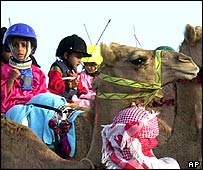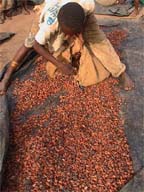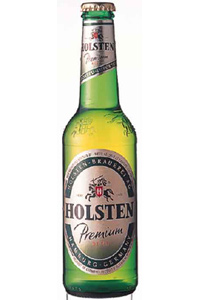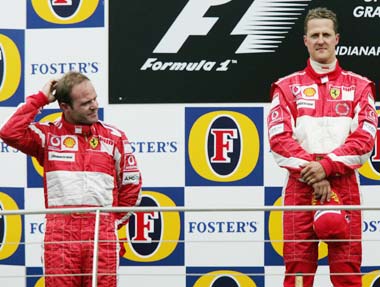Anyone who's opened a Bible or any other historical text pre-20th century has come across the concept of slavery. Definitions of 'slavery' on the web include:
- bondage: the state of being under the control of another person
- the practice of owning slaves
- work done under harsh conditions for little or no pay
www.cogsci.princeton.edu/cgi-bin/webwn2.1
- Slavery is any of a number of related conditions involving control of a person against his or her will, enforced by violence or other clear forms of coercion. It almost always occurs for the purpose of securing the labour of the person or people concerned. A specific form, chattel slavery, involved the legal ownership of a person or people, which is now illegal in all countries. People may be referred to as "slaves" simply because of the conditions in which they are held, not the law.
en.wikipedia.org/wiki/Slavery
- When a person (called "master") has absolute power over another (called "slave") including life and liberty. The slave has no freedom of action except within limits set by the master. The slave is considered to be the property of the master and can be sold, given away or killed. All the fruits of the slave's labor belongs to the master (see, for example, the extract from The 1740 South Carolina Slave Code in the History of the Law). Slavery was once very prevalent in the world but is now illegal in most countries.
www.duhaime.org/dictionary/dict-s.aspx
- The most extreme, coercive, abusive, and inhumane form of legalized inequality; people are treated as property.
highered.mcgraw-hill.com/sites/0072500506/student_view0/chapter14/key_terms.html
One would think that slavery has disappeared from our world in the 21st century. Indeed, slavery has been outlawed in most civilised nations around the world. And yet reports surface of a hidden truth about slavery; that it is not only alive and well, but is a flourishing underground industry.
In the Middle-East People are trafficked as slaves into Middle Eastern states from Africa, Southeast Asia, and Europe. Small pockets of chattel slavery persist, particularly in Saudi Arabia...
http://www.indystar.com/apps/pbcs.dll/article?AID=/20050604/NEWS06/506040503/1012

In Africa, Child slave trafficking routes run throughout the continent, with some children exported to the Middle East. In North Africa, racial divides on Africa's east and west coasts drive systems of chattel slavery. In Mauritania, hundreds of thousands are born into slavery. In Sudan, government militias storm southern villages and abduct women and children as slaves...
http://www.alertnet.org/thenews/newsdesk/L06227900.htm

More people are enslaved in Asia than any other continent. Millions are trapped in debt bondage throughout Southeast Asia, while human trafficking routes - particularly in sex slaves - cross the continent. Government-sponsored forced labor in Burma and China affects thousands. The most recent accounts tell of orphans from the tsunami in Indonesia forced into slavery...
http://www.khaleejtimes.com/DisplayArticle.asp?xfile=data/theworld/2005/June/theworld_June137.xml§ion=theworld&col=
http://www.newindpress.com/coastalcalamity/News.asp?Topic=-367&Title=&ID=IE920050105011033&nDate=&Sub=&Cat=
and even in the First World...
Trafficking in women flows from east to west in Europe. Thousands of women from the Ukraine, the Balkans, and other eastern states are lured or abducted into involuntary servitude, forced to work in brothels or as domestics...
http://news.bbc.co.uk/2/hi/europe/2931646.stm

In North America, Human trafficking routes run throughout the continent, often leading into the U.S. from Mexico, Canada, or overseas. Forced labor on Dominican sugar plantations persists, and poor Haitian children are held as "restavec" domestic slaves...
http://www.suntimes.com/output/news/cst-nws-slave05.html
http://www.canoe.ca/NewsStand/WinnipegSun/News/2005/06/04/1070796-sun.html
This scourge is still with us because there is a market for it. The only way to abolish slavery is to abolish the demand for slaves. The first step is awareness. If you have read this article you can no longer claim ignorance. The next time you buy a carpet, check if it has the 'Rugmark' label...
http://www.rugmark.org/

...if so, you'll be helping end the use of child labour in Nepal and Pakistan. When you next buy a bar of chocolate, ask yourself: "Where does the manufacturer get the cocoa?" The Ivory Coast produces a vast chunk of the world's cocoa, and much of it is harvested by child slaves...
http://www.stopchildlabor.org/internationalchildlabor/chocolate.htm

On Wednesday, December 8, 1999, the Middle East Forum hosted a conference in New York on the topic of slavery in the Middle East. The panel included three experts on the issue: Charles Jacobs, president of the American Anti-Slavery Group; Moctar Teyeb, who was born into slavery in Mauritania and escaped at age 18; and Samuel Cotton, author of "Silent Terror: A Journey into Contemporary African Slavery" (Harlem River Press, 1998) and executive director of the Coalition Against Slavery in Mauritania and Sudan.
Question:
What should be done to end slavery?Charles Jacobs:
In Sudan, slavery will be ended only when the war ends. This means either a partition of the country, in which the south has an independent or autonomous existence; or with the north dominating the south, in which case slavery might persist.Moctar Teyeb:
In the case of Mauritania, where slavery is widespread and systematic, it is important to pressure the Mauritanian government by halting international aid to Nouakchott. That aid helps to maintain the slavery system.Samuel Cotton:
It is crucial that the public be informed in a comprehensive manner. Once the public absorbs the information, it can ignite moral indignation to address the issue.There are many websites which combat slavery - here are a couple...
The American Anti-Slavery Group:
http://www.iabolish.comThe Anti-Slavery Society:
http://www.anti-slaverysociety.addr.com/index.htm















